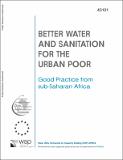
Publications & Research :: Publication
Better Water and Sanitation for the Urban Poor : Good Practice from Sub-Saharan Africa
Attachments [ 2 ]
More Details
The document is structured in three parts covering the key thematic areas of water supply service delivery, sanitation service delivery, and overall policy. Each part describes a series of different actions that can be taken to improve service delivery to low-income communities, outlines key lessons and challenges and identifies the principles of good practice. This project is aimed at developing a better understanding of the conditions necessary for water and sanitation services to reach low-income communities. It sought to build on the knowledge and experience of the various actors currently involved in delivering or supporting these services. One of the main observations of the authors is that there is never just one solution to any particular problem. Within each country context, the key to a successful strategy lies in the capacity of practitioners working in the water and sanitation sector to innovate and to adapt solutions to address local constraints and opportunities. This document aims to: (i) describe the challenges facing service delivery to low-income urban communities; (ii) outline key principles that guide water and sanitation sector practitioners in the delivery of services to the urban poor; and (iii) provide tangible examples from a range of sub-saharan African countries to illustrate these principles and challenges.
Comments
(Leave your comments here about this item.)